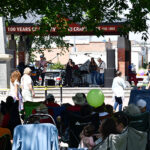Home »

Coelho leads readers to ask deep and hard questions
Book Review
By Derryll White
Coelho, Paulo (2004). Eleven Minutes.
Wherefore I say unto thee, Her sins, which are many, are forgiven; for she loved much; but to whom little is forgiven, the same loveth little. – Luke
The art of sex is the art of controlled abandon. – Paulo Coelho
 A very long time ago I read ‘The Alchemist’ by Paulo Coelho, and then ‘By the River Piedra I Sat Down and Wept.’ Both were fine books but I then got into a harder lifestyle suited to Jack Kerouac and Hunter S. Thompson and quit reading people like Coelho. A year ago a very good friend gave me ‘Eleven Minutes’ and told me I should read it, but I didn’t really pay attention. I should have at least read the cover where it says “a gripping exploration of the potentially sacred nature of sex within the context of love.”
A very long time ago I read ‘The Alchemist’ by Paulo Coelho, and then ‘By the River Piedra I Sat Down and Wept.’ Both were fine books but I then got into a harder lifestyle suited to Jack Kerouac and Hunter S. Thompson and quit reading people like Coelho. A year ago a very good friend gave me ‘Eleven Minutes’ and told me I should read it, but I didn’t really pay attention. I should have at least read the cover where it says “a gripping exploration of the potentially sacred nature of sex within the context of love.”
I think maybe she was trying to tell me something. In any case I am now spending my nights alone, reading Maria’s story of her struggle between the paths of darkness and light.
Coelho has the rare ability as a writer to invite his readers into his fantasy, his world. So, from the first page, I am asking questions of myself – does this relate to me? Yes. Do I have one foot in fantasy and the other in the abyss? Yes. Was I born innocent? Let me think about that one!
There are certain cautions in this novel. In her early life Maria decided that men “brought only pain, frustration, suffering and a sense of time dragging.” That’s a clear reminder that women will put up with almost anything, but don’t be boring. I forgot that – maybe that is why she gave me this book.
In part, Coelho’s novel is an exhortation of the power of positive thinking. In sex, as in life and love, one must expect the best of oneself. The desire has to be strong to make things happen, to move forward with pleasure and certainty, with excitement. He brings in the Marquis de Sade, which does almost nothing for me. I have experienced both momentary and intense, prolonged pain, real pain, in many past fights. It does nothing for me except hurt. I have always wanted only to bring pleasure to bed, and to share wholly in that pleasure. I read de Sade early in my life, and rejected his theories.
But Coelho also talks about desire, and the will to unite that which was once separated by divine intervention. Love becomes a journey, which has no ownership, which sometimes pauses in physical union, but which also proceeds outside of that fact. I like that thinking very much. Maybe that is why she gave me the book?
The most important dialogue in this book, for me, is that evolving around possession. Can we love without owning? Can we share, sexually or otherwise, without demanding return? We enter the oceans of desire willingly, wanting for both our self and the other fulfillment, happiness, an ultimate sharing. But can we actually do that and, at the culmination, give and receive freedom to live our lives in our own willful ways? I believe we can, but I know it is very hard to do. I believe we can give meaning to our life and share that creation with another, while continuing to walk our individual paths.
I suppose the one thing that really coalesced for me in reading ‘Eleven Minutes’ is that women do not understand men. I already knew that men didn’t understand women. But I always assumed women were kind of all-knowing when it came to men and sex. Coelho says that women think that all men think about is sex. That is what society pushes – through merchandising, advertising, religion and novels – sexuality and demonstrating your achievements in that field with a young woman on your arm. Little of that is true.
So, in the end I thank Paulo Coelho for this novel. I don’t agree with all that he says. I have some problems with his central concept of ‘eleven minutes.’ Most of all, however, he leads me to ask deep and hard questions of myself. And definitely, I should have read this book a year ago. Silly me!
I am the mother of my father
I am the sister of my husband
And he is my rejected son
Always respect me.
For I am the shameful and the magnificent one.
from Hymn to Isis
When I am sitting at the door of a tavern,
I, Ishtar, the goddess,
Am prostitute, mother, wife, divinity,
I am what people call life,
Although you call it death.
I am what people call Law,
Although you call it Delinquency.
I am what you seek
And what you find.
I am what you scattered
And the pieces you now gather up.
********
Excerpts from the novel:
MEN – With each day that passes I see more clearly how fragile men are, how inconstant, insecure and surprising they are…. a few of my girlfriends’ fathers have propositioned me, but I’ve always refused. At first I was shocked, but now I think it’s just the way men are.
DREAMS – Up until then, travel and the idea of going far away had just been a dream, and dreaming is very pleasant as long as you are not forced to put your dreams into practice. That way, we avoid all the risks, frustrations and difficulties, and when we are old, we can always blame other people – preferably our parents, our spouses or our children – for our failure to realize our dreams.
SEX – “For a night? Now come on, Maria, you’re exaggerating. It’s really only forty-five minutes, and if you allow time for taking off clothes, making some phony gesture of affection, having a bit of banal conversation, and getting dressed again, the amount of time spent actually having sex is about eleven minutes.”
Eleven minutes. The world revolved around something that only took eleven minutes.
LONELINESS – Human beings can withstand a week without water, two weeks without food, many years of homelessness, but not loneliness. It is the worst of all tortures, the worst of all sufferings.
LOVE – “All my life I thought of love as some kind of voluntary enslavement. Well, that’s a lie: freedom only exists when love is present. The person who gives him or herself wholly, the person who feels freest, is the person who loves wholeheartedly.
And the person who loves wholeheartedly feels free.”
MEMORY – …everyone, without exception, needs to burn on the bonfire of past emotions, to relive certain joys and griefs, certain ups and downs, until they can see the connecting thread that exists behind each new encounter, because there is a connecting thread.
LOVE – He should know that the great aim of every human being is to understand the meaning of total love. Love is not to be found in someone else, but in ourselves; we simply awaken it. But in order to do that we need the other person.
MARQUIS de SADE – …they are people who have never dared to look into the depths of their soul, never attempted to know the origin of that desire to unleash the wild beast, or to understand that sex, pain and love are all extreme experiences.
“Only those who know those frontiers know life; everything else is just passing the time, repeating the same tasks, growing old and dying without ever having discovered what we are doing here.”
SEX – …human beings were once divided and now seek the embrace that will reunite them. That is our instinct. But it is also our reason for putting up with all the difficulties that we meet in that search.
DESIRE – It had nothing to do with the automatic formula – I want to make love with you. I want to get married. I want you to have an orgasm. I want you to have my child. I want commitment. No, desire was an entirely free sensation, loose in the air, filling life with the will to have something – and that was enough, that will carried all before it, moved mountains, made her wet.
 – Derryll White once wrote books but now chooses to read and write about them. When not reading he writes history for the web at www.basininstitute.org.
– Derryll White once wrote books but now chooses to read and write about them. When not reading he writes history for the web at www.basininstitute.org.







